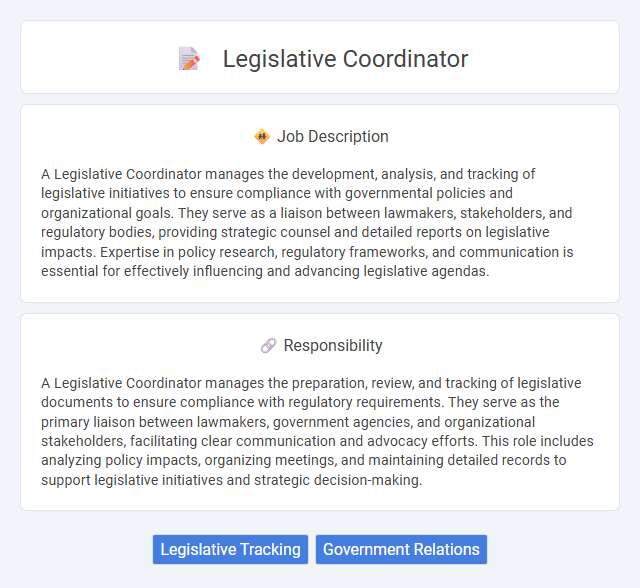
A Legislative Coordinator manages the development, analysis, and tracking of legislative initiatives to ensure compliance with governmental policies and organizational goals. They serve as a liaison between lawmakers, stakeholders, and regulatory bodies, providing strategic counsel and detailed reports on legislative impacts. Expertise in policy research, regulatory frameworks, and communication is essential for effectively influencing and advancing legislative agendas.
Individuals with strong organizational skills and an interest in public policy are likely suitable for a Legislative Coordinator role, as the job demands meticulous attention to detail and effective communication. Those comfortable with managing legislative documents, tracking legal changes, and collaborating with various stakeholders may find the position fulfilling and well-aligned with their abilities. However, people who prefer independent work with minimal deadlines or less structured environments might find this role challenging or less compatible with their work style.
Qualification
A Legislative Coordinator must possess strong analytical skills, excellent written and verbal communication abilities, and a deep understanding of legislative processes and government operations. A bachelor's degree in political science, public administration, or a related field is typically required, with preferred experience in policy analysis, legal research, or government relations. Proficiency in tracking legislative developments, preparing briefing materials, and coordinating stakeholder communications is essential for success in this role.
Responsibility
A Legislative Coordinator manages the preparation, review, and tracking of legislative documents to ensure compliance with regulatory requirements. They serve as the primary liaison between lawmakers, government agencies, and organizational stakeholders, facilitating clear communication and advocacy efforts. This role includes analyzing policy impacts, organizing meetings, and maintaining detailed records to support legislative initiatives and strategic decision-making.
Benefit
Legislative Coordinators likely benefit from gaining in-depth knowledge of government processes and policy development, which can enhance career advancement opportunities within public administration or advocacy roles. The position probably offers valuable networking prospects with lawmakers and industry stakeholders, increasing professional visibility and influence. Competitive salaries and comprehensive benefits packages, including health insurance and retirement plans, may also contribute to the overall job appeal.
Challenge
The role of a Legislative Coordinator likely involves navigating complex regulatory environments and managing intricate communication between lawmakers and stakeholders. They probably face the challenge of keeping up with rapidly changing legislation while ensuring accurate and timely information dissemination. Balancing conflicting priorities and addressing urgent policy issues may require quick decision-making and strategic problem-solving skills.
Career Advancement
A Legislative Coordinator plays a critical role in managing policy research, tracking legislation, and supporting advocacy efforts within government or organizational settings. Mastery of legislative processes, strong networking with policymakers, and expertise in regulatory analysis open pathways to advanced roles such as Legislative Director or Government Affairs Manager. Continuous professional development and experience in coordinating multi-stakeholder initiatives significantly enhance career growth opportunities within public administration or political consulting.
Key Terms
Legislative Tracking
Legislative Coordinators specialize in legislative tracking by monitoring and analyzing proposed bills, statutes, and regulatory changes to ensure organizational compliance and strategic response. They utilize comprehensive databases and legislative management software to provide timely updates and detailed reports on policy developments relevant to their industry. Proficiency in interpreting legislative language and maintaining stakeholder communication enhances effective decision-making and advocacy efforts.
Government Relations
A Legislative Coordinator in Government Relations manages communication between government agencies and stakeholders to influence public policy. They analyze legislative proposals, track regulatory changes, and prepare detailed reports to support advocacy efforts. Strong knowledge of legislative processes and strategic engagement ensures effective representation of organizational interests in the political arena.
 kuljobs.com
kuljobs.com